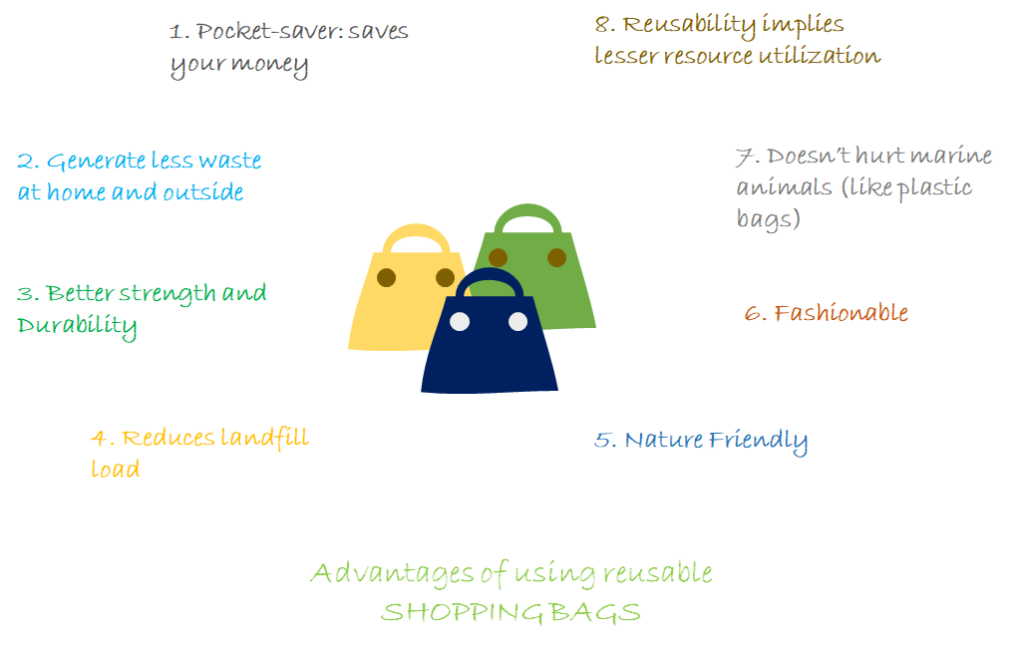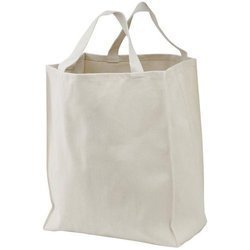
Shruti Bansal, an environmental blogger who is a post-graduate (M. Tech) from IIT Kanpur in Environmental Engineering & Management. She has a diverse experience of about 4 years working with educational institutes (Jahaan Preschool), corporates (e.g. IL&FS), a research institute (e.g. NIDM) and start-ups (GCRS, Pro India). Her experience and research area include Climate Change, Climate Change Adaptation, Disaster Management, Solid Waste Management and Carbon Footprints. She is keen on utilizing her talent for the betterment of the environment. With experience as a Founding Principal of Jahaan Principal, she has also an interest in Early Childhood Education.
Shruti as a Guest Blogger with The EarthView describes the importance of using reusable shopping bags in her blog Reuse your shopping bags to reduce your environmental footprints
To reduce the use of plastic bags, reusable nature friendly shopping bags seems like a good alternative. There are many advantages of these reusable bags over plastic bags, some of these are explained in figure:

Figure 1 (source: https://madforgreen.blogspot.com/2020/09/sustainability-of-eco-friendly-bags.html)
Just by looking at these advantages, you might choose biodegradable, eco-friendly reusable bags over plastic bags. But, just choosing eco-friendly bags is enough? No, because these bags have high environmental footprint. For some of the indicators (e.g. water footprint, carbon footprint) these bags are way more toxic than plastic bags. To make these reusable bags actually friendly for earth, we must reuse them as much as possible. Just buying these reusable bags is not enough, you need to optimize their use. First let me explain you the toxicity of plastic, cotton and paper bags. Thereafter, I believe you will be good to choose the best option for your planet.
Table 1 Comparison matrix of plastic, paper and cotton bags
| S. No. | Plastic bags | Paper bags | Traditional cotton bags | Organic cotton bags |
| Non-biodegradable | Biodegradable | Biodegradable | Biodegradable | |
| Generally single time use | Generally single time use | Reuse is common | Reuse is common | |
| Good in strength | Not suitable for heavy weights | Good in strength | Good in strength | |
| Not durable (lose its colour and shape after every use) | Not durable | Durable | Durable | |
| Water & Carbon footprint: low | Water & Carbon footprint: much higher than plastic bags. (requires 4 times more water and emits 3.1 times more GHG than plastic bags) | Water & Carbon footprint: Very high (270 kg Co2 equivalents, 4,ooo litres of water for a bag weighing 200 gm) | Water & Carbon footprint: highest (approximate requirement is 30% higher than traditional cotton) |
No. of reuses of different variety of bags required to match the environmental impact of plastic bags: Paper Bags stand at 43 while Traditional Cotton bags and Organic Cotton bags stand at 7100 and 21000 respectively.
Plastics are considered ‘strictly no’ considering, they are non-biodegradable. From harming tourism, spoiling our health to putting marine life in danger, plastics are harmful for us. All over the world billion tonnes of plastics goes into landfill. Plastics are capable of being recycled but generally plastics go into landfill/ ocean without being recycled.
Paper is biodegradable but that doesn’t mean they are good for our planet. Paper production has huge carbon and water footprint. Also, paper production requires clearing of forest. To match the environmental impact of plastics, paper should be reused 43 times. Sadly, paper bags are discarded after single use.
Cotton is a thirsty crop, hence has lot of water footprints. No doubt, they are better in strength and are durable, but one cannot ignore the fact that cotton requires larger amount of water and has high carbon footprints. Organic cotton is even worse than this traditional cotton. As, it gives 30% lower yield than traditional cotton and hence is more water and carbon intensive.

Figure 2 No. of reuses necessary for different category of bags to match the same environmental impacts that plastic bags have (Source: https://madforgreen.blogspot.com/2020/09/sustainability-of-eco-friendly-bags.html)
So, what’s the best decision?
Everything you buy has some amount of environmental impact linked. Same goes with shopping bags, whether you go with plastic, paper or cotton bags. The production, use and disposal of these, harms the planet. If you really care for your planet, try minimizing your purchase. Let’s see, the best you can do, by understanding the following pointers:
- Always reuse what you have, if you can, whether it’s plastic or cotton. Disposing without utilizing properly is the worst thing
- Place your shopping bags inside your vehicle (e.g. car, bikes) or in your office bags,
- If you have plastic bags, and you cannot reuse it further, try to dispose it in the recycling centres
- If you already have cotton or organic cotton bags, refrain yourself from buying additional bags. Reuse it everywhere.
- Spread awareness among your friends and family about the same and be an ‘environmental saviour’

